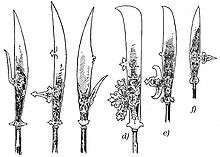Definify.com
Webster 1913 Edition
Glaive
1.
A weapon formerly used, consisting of a large blade fixed on the end of a pole, whose edge was on the outside curve; also, a light lance with a long sharp-pointed head.
Wilhelm.
2.
A sword; – used poetically and loosely.
The
glaive
which he did wield. Spenser.
Definition 2026
glaive
glaive
English
Noun
glaive (plural glaives)
- A weapon formerly used, consisting of a large blade fixed on the end of a pole, whose edge was on the outside curve.
- 1786, Francis Grose, A Treatise on Ancient Armour and Weapons, page 52.:
- The Welch Glaive is a kind of bill, sometimes reckoned among the pole axes.
- 1786, Francis Grose, A Treatise on Ancient Armour and Weapons, page 52.:
- A light lance with a long sharp-pointed head.
- (poetically or loosely) A sword.
- Edmund Spenser:
- The glaive which he did wield.
- 1913, Francis Thompson, The Works of Francis Thompson, volume II (Poems), London: Burns Oates & Washbourne, OCLC 832969228, page 124:
- Yea, that same awful angel with the glaive / Which in disparadising orbit swept / Lintel and pilaster and architrave
- Edmund Spenser:
Translations
weapon formerly used consisting of a large blade on a pole
a sword (poetically or loosely)
Anagrams
French
Etymology
From Old French glaive, from Latin gladius (“sword”)
Pronunciation
- IPA(key): /ɡlɛv/
Noun
glaive m (plural glaives)
- gladius, short sword
- (figuratively) sword
Old French
Alternative forms
- gladies (10th century)
- gleve
- gleyve
Etymology
Probably from an original *glede (from Latin gladius) with influence from Gaulish gladebo (“sword”). Both terms are ultimately from Proto-Celtic *kladiwos (“sword”). Alternatively, the d in *glede that had come to be pronounced as /ð/ in Old French may have been fronted to /v/ (perhaps with the additional influence of the aforementioned Gaulish term.)
Noun
glaive m (oblique plural glaives, nominative singular glaives, nominative plural glaive)
- sword
- circa 1170, Wace, Le Roman de Rou:
-
Son glaive i a li Dus lessié
- The Duke left his sword there.
-
Son glaive i a li Dus lessié
-
Descendants
References
- (fr) Godefroy, Frédéric, Dictionnaire de l'ancienne langue française et de tous ses dialectes du IXe au XVe siècle (1881) (glaive)
- glaive on the Anglo-Norman On-Line Hub
